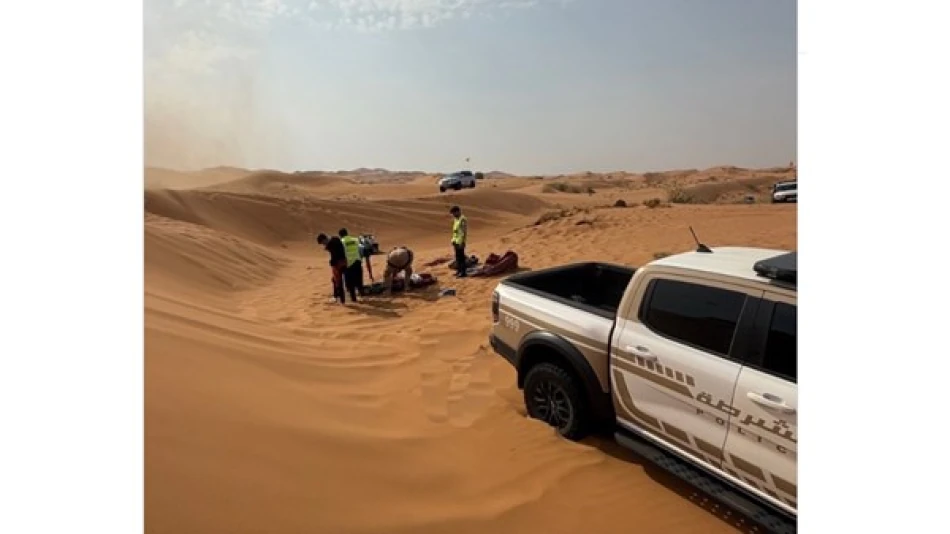
Sharjah Police and National Guard Rescue Emirati in Motorcycle Accident
UAE Desert Rescue Highlights Growing Safety Concerns as Off-Road Recreation Booms
A successful multi-agency rescue operation in Sharjah's remote Rafada desert underscores both the UAE's impressive emergency response capabilities and rising safety challenges as desert motorsports gain popularity. The incident, involving a motorcycle crash that left a rider with moderate injuries, required coordinated efforts between police and National Guard search-and-rescue teams to reach the victim in the challenging terrain of Al Madam's central region.
Swift Response Saves Lives in Remote Terrain
Sharjah Police received the emergency call at 7:09 AM on Sunday morning, reporting a motorcycle accident in the Rafada desert near Al Madam city. The location's remoteness—typical of the UAE's vast interior desert regions—posed immediate challenges for rescue teams.
The response demonstrated the UAE's investment in emergency infrastructure. Specialized rescue teams deployed immediately, supported by a National Guard search-and-rescue aircraft that proved crucial for evacuation. The injured rider was airlifted to Al Dhaid Hospital, where medical teams confirmed his condition had stabilized. He was discharged after receiving necessary treatment.
Multi-Agency Coordination Sets Regional Standard
The operation showcased seamless coordination between Sharjah Police and the National Center for Search and Rescue. This level of inter-agency cooperation has become a hallmark of UAE emergency services, setting benchmarks that other Gulf nations increasingly seek to emulate.
Desert Recreation Boom Creates New Safety Challenges
This rescue reflects broader trends across the UAE, where desert motorsports have exploded in popularity over the past decade. The country's vast desert landscapes, improved road access, and growing expatriate population have fueled interest in off-road activities ranging from dune bashing to motorcycle touring.
However, this recreational boom has created new safety challenges. The UAE's interior deserts, while accessible, can quickly become dangerous for inexperienced riders. Extreme temperatures, shifting terrain, and limited cell coverage compound risks when accidents occur in remote areas.
Regulatory Response and Prevention Efforts
Sharjah Police used the incident to reinforce safety messaging, urging motorcycle enthusiasts to follow established guidelines for desert activities. The force emphasized that inadequate preparation and reckless driving in remote or difficult terrain can lead to serious accidents where emergency response becomes extremely challenging.
This educational approach reflects the UAE's broader strategy of balancing recreational freedom with public safety. Rather than restricting desert access, authorities focus on awareness campaigns and rapid response capabilities.
Emergency Infrastructure Investment Pays Dividends
The successful rescue highlights the UAE's substantial investment in emergency services infrastructure. The National Guard's search-and-rescue capabilities, including helicopter units, represent significant government spending on public safety that extends far beyond urban areas.
This investment strategy differs markedly from approaches in neighboring countries, where emergency services often concentrate on major population centers. The UAE's commitment to covering vast desert regions reflects both its tourism ambitions and recognition that recreational activities drive economic activity.
Technology and Communication Advances
The incident also demonstrated the importance of the UAE's emergency communication systems. Sharjah Police reminded the public to use 901 for general inquiries and non-emergency reports, while 999 remains available for critical situations. This tiered approach helps optimize response resources while ensuring genuine emergencies receive immediate attention.
The broader implications extend beyond individual safety. As the UAE continues positioning itself as a regional hub for adventure tourism and outdoor recreation, maintaining world-class emergency response capabilities becomes essential for protecting both residents and visitors who venture into the country's challenging but spectacular desert environments.
Most Viewed News

 Layla Al Mansoori
Layla Al Mansoori






